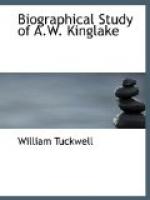He found great enjoyment in parliamentary life, but was in 1868 unseated on petition for bribery on the part of his agents. Blue-books are not ordinarily light reading; but the Report of the Commissioners appointed to inquire into the alleged corrupt practices at Bridgewater is not only a model of terse and vigorous composition, but to persons with a sense of humour, inclined to view human irregularities and inconsistencies in a sportive rather than an indignant light, it is a sustained and diverting comedy. Of the constituency, both before and after the Reform Bill, three-fourths, the Commissioners artlessly inform us, sought and received bribes; of the remainder, all but a few individuals negotiated and gave the bribes. So in every election, both sides bribed avowedly; if a luckless Purity Candidate appeared, he was promptly informed that “Mr. Most” would win the seat: highest bribes decided each election, further bribes averted petitions. When once a desperate riot took place and the ringleaders were tried at Quarter Sessions, the jury were bribed to acquit, in the teeth of the Chairman’s summing up. At last, in 1868, the defeated candidate petitioned; blue-book literature was enriched by a remarkable report, and the borough was disfranchised. Of course Kinglake had only himself to thank; if a gentleman chooses to sit for a venal borough, and to intrust his interests to a questionable agent, he must, in the words of Mrs. Gamp, “take the consequences of sech a sitiwation.” The consequences to him were loss of his present seat, and permanent exclusion from Parliament.
He was keenly mortified by his ostracism, speaking of himself ever after as “a political corpse.” Thenceforward he gave his whole energy to literary work, to occasional reviews, mainly to his “Invasion of the Crimea.” In the “Edinburgh” I think he never wrote, cordially disliking its then editor. A fine notice in “Blackwood” of Madame de Lafayette’s life was from his pen. Surveying the Revolutionary Terror, he points out that Robespierre’s opponents were in numbers overwhelmingly strong, but lacked cohesion and leaders; while the Mountain, dominated by a single will, was legally armed with power to kill, and went on killing. The Church played into Robespierre’s hands by enforcing Patience and Resignation as the highest Christian virtues, confusing the idea of submission to Heaven with the idea of submission to a scoundrel. Had Hampden been a Papist he would have paid ship-money. He wrote also in “The Owl,” a brilliant little magazine edited by his friend Laurence Oliphant; a “Society Journal,” conducted by a set of clever well-to-do young bachelors living in London, addressed like the “Pall Mall Gazette,” in “Pendennis,” “to the higher circles of society, written by gentlemen for gentlemen.” When the expenses of production were paid, the balance was spent on a whitebait dinner at Greenwich, and on offerings of flowers and jewellery to the lady guests invited. It came to an end, leaving no successor equally brilliant, high-toned, wholesome; its collected numbers figure sometimes at a formidable price in sales and catalogues. {15}




